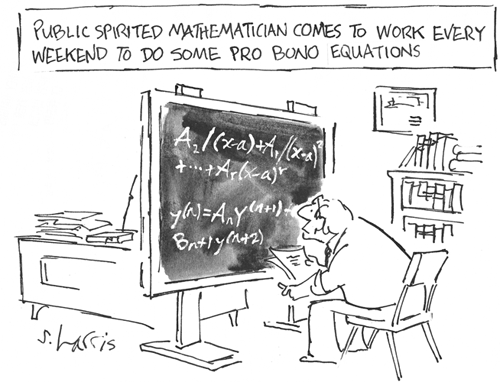Yoram Gat, one of our new Contributing Editors, describes himself in his blog (also called Pro Bono Statistics) like this: “I am a statistician and software engineer, living in Israel. My interests include politics (theory and practice) and statistics (theory and practice).”
Yoram said the inspiration for the title of this column, and his blog, came from this cartoon by Sidney Harris:
Statistics is generally practiced as a tool for owners of datasets. It is the nature of datasets that they are owned by large organizations —
mostly governments and corporations. In this way, statistics becomes a tool employed by powerful organizations, and the powerful people who control them, to further their objectives. The average member of society is then subject to the effects of this tool without having a say about how it is employed. Over the last few years this situation has been highlighted by the “big data” industry and government mass surveillance operations. However, the pattern of statistics being the tool of the powerful has been in place ever since the rise of statistics (and is reflected in the term “statistics” itself).
To some extent the fact that statistics serves concentrated power is unsurprising since this is a characteristic of much of, if not all of, science. Science and its application require resources and it is the powerful that have the resources to invest. It is therefore powerful organizations that control science and the effects of science on the public are mediated by the objectives of those organizations. The degree to which the effects are positive depends on the degree to which those objectives are aligned with the public interest.
In a well functioning democratic society the power of the state and other organizations is harnessed to benefit all the members of society. In these circumstances, therefore, increasing the power of those organizations, as statistics effectively does, is a positive outcome. That, however, is not the perceived situation in many countries around the world. There is a public sentiment, quite widespread globally, that concentrated power is serving narrow interests rather than those of the public. “Big data” business and mass surveillance, for example, have created significant concerns about the invasion of privacy and the potential for oppression. In such a situation, further empowering the powerful is an ethically questionable activity.
But if science in general naturally tends to buttress established power, statistics has the potential to be different. Statistics is a sub-branch of epistemology, the philosophical theory of knowledge, and inherits from epistemology its core commitment to skepticism. As much as it is concerned with generating new knowledge, statistics is concerned with critically examining established belief and debunking false claims. Such an examination is inherently subversive and has the potential to mount a persistent challenge to authority.
By deliberately and systematically adopting a critical outlook, statistics and statisticians can contribute to the wellbeing of society as a whole, and to the wellbeing of the average citizen. Rather than limiting themselves to analyzing data sets thrust upon them, answering questions handed to them, and serving agendas set for them, statisticians can actively cast the net of their inquiry far and wide, seek root causes and fundamental assumptions, examine claims of knowledge and question established power and self-proclaimed sources of authority with a critical and skeptical mind. It is not difficult to come up with examples where examinations of this kind could serve the public well.
Steps promoting this skeptical mission can be taken at the personal and at the institutional levels. At the personal level, students of statistics can be trained to proactively apply critical, methodical, open minded, radical thinking to the world around them. Rather than limit this attitude to specialized scenarios (answering textbook and test questions, data analysis, reviewing academic papers, and evaluating mathematical models and proofs), a habit of doubt, especially about convention and authority, may be inculcated. This can be part of the entire statistics curriculum — from widely administered introductory courses all the way to graduate courses, seminars and thesis advice.
Institutionally, statistical working groups can be formed with the purpose of identifying and critically examining various issues that are of interest to the public. Journals can be created that publish papers defining and evaluating criteria for the public value of existing beliefs, institutions and activities. Such work may to some extent overlap with work in other academic departments (sociology, economics, political science, medicine, environmental science) and in news-media. However, statistics always has a cross-disciplinary tendency and the emphasis of those investigations should be on radical doubt, on taking a fresh look without a priori commitments, on challenging dogma. Such a skeptical attitude is easier to maintain for those coming from the outside than for those working within a discipline or within an industry and who are therefore constantly subject to pressures to conform to the established views in those communities and to align with their power structures.
Modern official ideology often prides itself for encouraging skepticism and critical examination. Such ideals, however, are hard to live up to in practice, as the treatment of whistleblowers demonstrates. A community of skeptics within the establishment itself would quite possibly be met with alarm and hostility. Being critically examined and measured is a situation that average people are expected to live with in the educational system and in their workplaces, but which powerful people and institutions are often unaccustomed to. It should be interesting to see what happens if this changes.
—
Yoram would be happy to have a critical and skeptical conversation about the topics he discusses in this column. He invites readers to comment on this column below, or you can email us at bulletin@imstat.org.

Comments on “Pro Bono Statistics: Statistics in the Public Interest”